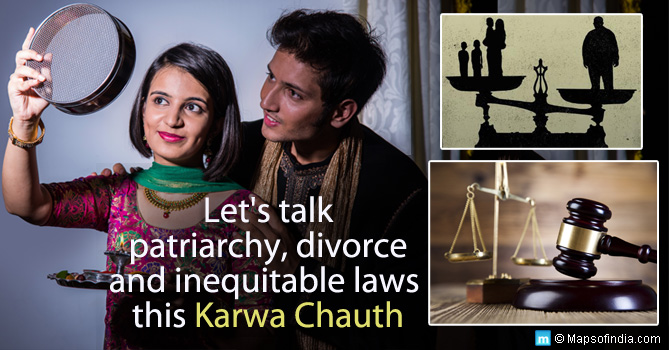Karwa Chauth.
The day Indian women deck up in all their finery and go through the day, from sunrise to sunset, without food or water. All for their husbands to enjoy a long life and prosperous year. Each year hundreds of thousands of Hindu women undertake this arduous fast and men wear it on their lapel as a matter of pride. While recently some men have taken to fasting in solidarity with their women (thanks for the inspiration, DDLJ).
A few days ago, over the Navratri, we brought the Goddess home and worshipped her with great fervour. But is the Feminine Divine really worshipped in India? What about our social outlook? Are our laws, our rules and dictates not loaded against the women? Even in these “modern” times?
Pawns of patriarchy
If you thought patriarchy was a thing of the past and modern Indian women are emancipated, at least when it comes to legal recourse, think again. Earlier this month, On 6 October, 2016, the Supreme Court of India ruled that a Hindu man could divorce his wife on the grounds of cruelty if she tried to separate him from his elderly parents. The apex court said, “in a Hindu society, it is a pious obligation of the son to maintain the parents…persistent effort of the wife to constrain the husband to be separated from the family… constitute an act of cruelty”, thereby automatically granting the man grounds for divorce.
Problem is, when the SC did come out with such an epic ruling loaded with morality, it wasn’t around to answer the questions Indian women raised on Social Media and elsewhere –
@SreejataGupta: “A time when triple talaq is banned, a Hindu man can divorce a woman if she tries to separate him from his family. The irony.”
@waatho: “Woman leaves parents to live with husband–> marriage.
Man says wife tried to separate him from parents–> ground for divorce.
Go figure.”
@littlemaster45: “#IndianJudiciarySystem Separating Old parents is not acceptable but Separating husband wife cant be a soln”
@poonam_thukral: “A Hindu son has the right to divorce his wife, who does not want to live with his parents, reinscribes Hindu women as second class citizens.”
@radhagokhale: “What if the parents try to separate him from his wife? Can he #divorce them? Some of these equations are complex and skewed.”
@Agratha: “What about the part where women are separated from their parents? Or do we just ignore them because they’re women?”
Speaking of divorce
It is not only Hindu women who are bearing the brunt of lopsided divorce laws. Let us take a look at the Triple Talaq – an issue that has now split the country’s Muslim populace wide apart. In the absence of a Uniform Civil Code, Indian women continue to knock on the door of the Supreme Court asking for a ban on the Triple Talaq – a system that allows Muslim men to divorce their wives unilaterally by pronouncing the word ‘talaq’ three times in a row.
What is more is that such a divorce may be gained over a text message or even through Facebook.
Last week, a 19-year-old girl from Muzaffarnagar in UP was divorced by her husband who pronounced the Triple Talaq over the phone (from Saudi Arabia). Her husband was upset that the woman had given birth to a daughter. Despite such instances, the All India Muslim Personal Law Board (AIMPLB) has vehemently opposed a ban on the practice and calls it an affront to Muslim freedom. The AIMPLB even defended the practice by saying that it keeps the husband from killing his wife and from soiling her character in a court of law.
Before we take up a religious stance on this issue, it may do to remember that over 20 Islamic countries of the world (including Pakistan) have banned the practice. In its true light, this remains another biased gender issue.
Domestic violence against women
According to news reports from 2015, about 2.24 million cases of crimes against women were reported since 2005. This comes down to about one complaint of a crime or abuse every two minutes. According to the National Crime Records Bureau, 909,713 cases of cruelty by husbands against wives and by relatives against a woman were recorded between 2005 and 2015. While taken as a whole, these statistics may seem alarming, isolated cases in the immediate family, among friends, and even in our social circle fail to raise questions.
In 2015 alone, there was a 20 percent increase in reports of crimes against women in the national capital. This includes a 27 percent rise in the number of rape cases registered. While we may take pride in the fact that our women drive cars and even fly aircrafts, we must stop to wonder if much has changed in the condition of the average Indian woman.
The other face of the gender wars
While we speak of domestic violence and abuse, it is important to acknowledge that the victims are not always women. With a rampant misuse of Section 498A, the section of the Indian Penal Code that deals with a husband’s cruelty, it has become necessary that women indulging in cruelty also need to be taken to task. Men and their families are also entitled to the equal protection of law — a fact that we need to be reminded of regularly.
For India to move ahead as a cohesive and progressive society it is important to bridge the gender gap in terms of our perception and legal system. Holding women hostage to an age old social norm that makes her a second class citizen is not only regressive, but also sets us back by centuries. Implementing the Unified Civil Code is an important step in this process.
It is time we gift the wives in our society the greatest and best gift on Karwa Chauth – equality in its true sense.
Read More:
Read More:
Karva Chauth Gift Ideas
Know all about Karva Chauth 2016
Know why and how to Celebrate Karva Chauth
Which role are you playing for a happy life?





